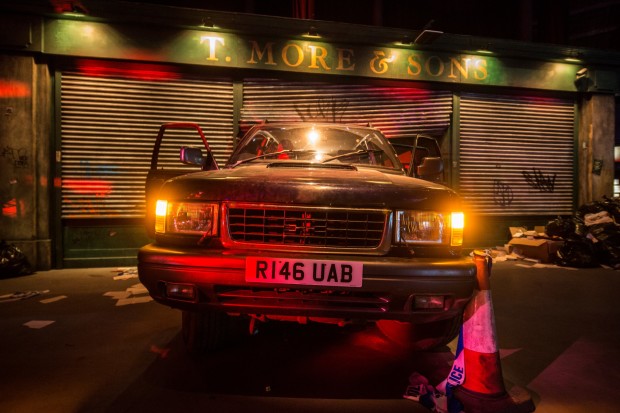You have no items in your cart. Want to get some nice things?
Go shopping
Penny Woolcock’s immersive art installation Utopia tackles weighty, challenging issues – but then, she has never been afraid to take the radical approach in her career as a filmmaker, writer and artist. An imaginatively executed, disruptive piece of work, the installation – part of the annual Bloomberg Summer festival at the Camden Roundhouse – is designed to make participants question the nature of our society. A utopia, to borrow Voltaire’s phrasing in Candide, is “the best of all possible worlds”, and Woolcock dares us to move towards, as she calls it, “a different audacity, another kind of dreaming”. Last week, a Utopia Live Late event also included related talks and performances from underground rappers.
The earliest literary reference point for Woolcock’s Utopia is Plato’s Republic, specifically the Allegory of the Cave. Plato asks us to imagine people living underground in a den since childhood, shackled and unable to so much as turn their heads. All that they know is limited to what they can see in the darkness of the cave. Plato then asks us to consider what would happen if these same people were released from the cave into the open. At first, the light would blind them and it would be a painful experience – but the ultimate upshot would be that they gain a much truer conception of reality. In a recent interview with The Independent, Woolcock explains that one young man who was imprisoned following the London riots began reading philosophy. He “enjoyed making sense of Plato’s Republic: the analogy of the cave, where people think they’re living in one reality but they’re not”, and his story features in the installation. Like those leaving the cave, we need to strive to see beyond our immediate surrounds and into the deeper truths underlying the way society and the world function. In fact, Woolcock explicitly says: “Utopia is for all of us who are thinking about leaving the cave.” In modern society, leaving the cave means disentangling ourselves from meaningless pursuits such as excessive consumerism and an idolisation of a celebrity culture. These are the illusory trappings, the false conceptions of reality that Plato surely would have warned against.
Woolcock references another much more recent literary work from 1981, Jean Baudrillard’s Simulacra Simulacrum, as the spark for her idea to use cardboard boxes. Piled high and haphazardly on top of each other, they form the main tower in the exhibition as well as a “factory room”. Baudrillard argues that nothing is original anymore; everything is a copy of another copy. This is “hyperreality”. Woolcock adds: “In our factory they have given up making anything at all, they just construct empty boxes selling popularity, desirability and cool.” The empty boxes are therefore not even a copy, but entirely insubstantial. They also denote the false packaging and peddling of illusory “values” that clutter our minds – as such words as “popularity”, “desirability” and “cool” have been made meaningless through their constant use in advertising.
Additionally, our celebrity culture has much to answer for when it comes to peddling false values. In another part of the exhibition, a video plays in which images of celebrities like Posh and Becks and Kim Kardashian alternate with much more hard-hitting clips of sweatshop workers and the London riots. Woolcock is coaxing us to put aside the distractions of celebrity culture and leave the cave, step into the light and uncover the real issues affecting society, such as exploited labour and social unrest. This video also works on another level: it recalls Debord’s seminal 1967 work Society of the Spectacle, in which he argued that true relationships have been replaced by “the spectacle”, an image saturated world. By watching the video, participants are actually unwittingly entering into and reinforcing Debord’s notion.
Utopia also aims to provide an antidote to overhyped media stories of celebrities by offering up more real, raw stories. Woolcock explains that as participants wander around the installation, they “trigger stories from unexpected sources, things you wouldn’t normally hear about… People tell stories about themselves but this also becomes part of a bigger truth”. This statement unlocks the most urgent aspect of the exhibition: her intent to give a voice to the marginalised. Walking through a desolate landscape in which bricks, rubble, fridges, phone boxes and shopping trollies are strewn about, you activate these stories – many of which are concerned with living at the sharp end of life in London. The sound clips emerge from hypersonic speakers, meaning that once you find where precisely a story is coming from, you have to lean right in to hear it. This immediately creates a direct bond between you and the person speaking.
The underground rappers who performed at the Live Late – Awate, Amy True and Akala – all shared Woolcock’s urgency to tell the stories of the dispossessed. Their politically charged performances also reinforced another plank of Woolcock’s message: that we must maintain our individuality in the face of consumer onslaughts and a celebrity culture foisted on us by the mainstream media. In a wide-ranging interview Awate conducted with Akala, covering everything from colonialism to misogyny and the nuances of race, Akala quoted Malcolm X as saying: “The media will have you hating the people who are oppressed.” The mainstream media plays an active role to either silence or misrepresent the oppressed. Akala cited the often irresponsible and incorrect reporting around the murder of Mark Duggan as a case in point.
It has become more urgent than ever to share the stories of those on the fringes of society as a counter narrative to prevailing, often skewed mainstream narratives. This is ultimately what makes Woolcock’s Utopia so timely and important.
Utopia continues at the Roundhouse until Sunday August 23.

About Ana Malinovic
Ana graduated from Warwick University with a BA in English and American Literature in 2010. Her dissertation was centred on dystopian elements in the fiction of Kafka. She enjoys uncovering innovative works of fiction by a diverse range of authors. She also spends much of her time roaming around London's arts and culture scene overexcitedly. Check out her blog




